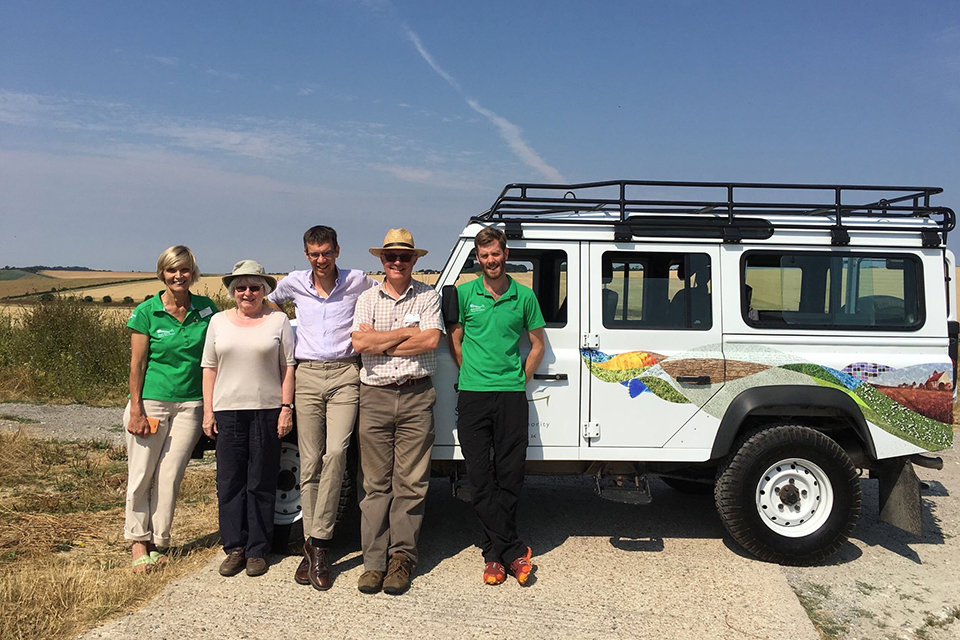Independent report: Landscapes review: National Parks and AONBs
Updated: Added a link to the call for evidence that was launched on 20 October 2018. The closing date for responses is 18 December 2018.
We’re carrying out a review into whether the protections for National Parks and AONBs are still fit for purpose. In particular, what might be done better, what changes will help and if the definitions and systems in place are still valid.
The review will be led by Julian Glover and supported by an experienced advisory group. The members of the group have been announced as Lord Cameron of Dillington, Jim Dixon, Sarah Mukherjee, Dame Fiona Reynolds and Jake Fiennes. The review started in June 2018 and will report in 2019.
The review’s terms of reference set out what it will look at and how it will be carried out.

What it’s about
It is nearly 70 years since a bold decision was taken by Parliament to preserve some of England’s finest landscapes and help people visit and enjoy them.
England is home to 10 National Parks and 34 Areas of Outstanding Natural Beauty (AONBs). Their rugged mountains, unspoilt coastlines, farmed landscapes and vast moorlands attract more than 260 million visitors a year and are home to over 2.3 million people.
Now, 7 decades after a visionary report led by Sir Arthur Hobhouse led to their creation, it’s time to renew the mission. As part of the 25 Year Environment Plan, the government has asked Julian Glover to lead an expert panel looking at how these protections can be renewed.
The review’s purpose is to ask what might be done better, what changes could assist these areas, and whether definitions and systems – which in many cases date back to their original creation – are still sufficient. Weakening or undermining existing protections or geographic scope are not considered.
Instead, the review will look at:
- the existing statutory purposes for National Parks and AONBs and how effectively they are being met
- the alignment of these purposes with the goals set out in the 25-Year Environment Plan
- the case for extension or creation of new designated areas
- how to improve individual and collective governance of National Parks and AONBs, and how that governance interacts with other national assets
- the financing of National Parks and AONBs
- how to enhance the environment and biodiversity in existing designations
- how to build on the existing eight-point plan for National Parks and to connect more people with the natural environment from all sections of society and improve health and wellbeing
- how well National Parks and AONBs support communities
- the process of designating National Parks and AONBs and extending boundary areas, with a view to improving and expediting the process
What happens next
So far, the review has focused on visiting these places and talking to people that visit, live or work in and care for them. Between them, the panel have already visited many National Parks and AONBs and plan to continue this into 2019.
Please tell us what you think about our National Parks and AONBs by taking part in our call for evidence. The closing date for responses is 18 December 2018.
We expect to publish the report making recommendations to government in Autumn 2019.
Who’s involved
Led by Julian Glover, the panel also includes Lord Cameron of Dillington, Jim Dixon, Sarah Mukherjee, Dame Fiona Reynolds and Jake Fiennes.

Learn more about the panel members
Julian Glover – Lead Reviewer
Associate editor at the London Evening Standard and author of the biography Man of Iron: Thomas Telford and the Building of Britain. He has worked as leader writer and columnist at the Guardian and as a Special Adviser in Number 10 and the Department for Transport.
Lord Cameron of Dillington
Cross-bench peer, farmer and landowner. As the former Chair of the Countryside Agency, he is a strong advocate for rural affairs. He is currently the chair of the Natural Environment and Rural Communities Act 2006 Committee and the Advisory Council for the Centre for Ecology and Hydrology. He is also on the Steering Board of the Government’s Global Food Security Programme.
Jim Dixon
Chief Executive of the Peak District National Park Authority for 12 years, before stepping down in 2014. He is currently a writer on countryside issues, including for the Times, and a trustee of the Heritage Lottery Fund.
Sarah Mukherjee
Former BBC environment and rural affairs correspondent and previous Director of Environment at Water UK. She is currently Chief Executive of the Crop Protection Association. She is a trustee and advisory group member for several charities, supporting both environmental stewardship and education in farming.
Dame Fiona Reynolds
Formerly the Director-General of the National Trust and current Master of Emmanuel College, Cambridge and Chair of the Green Alliance. She is the author of The Fight for Beauty (2016), a history of thought and public policy on landscapes and environment in Britain.
Jake Fiennes
Became General Manager for Conservation of the 25,000 acre Holkham Estate in autumn 2018 after 24 years as Estate Manager promoting nature conservation alongside arable farming at Raveningham Estate. He is also a trustee and advisory group member of several organisations including the National Farmers’ Union’s Environmental Forum and the Norfolk Farming and Wildlife Advisory Group.